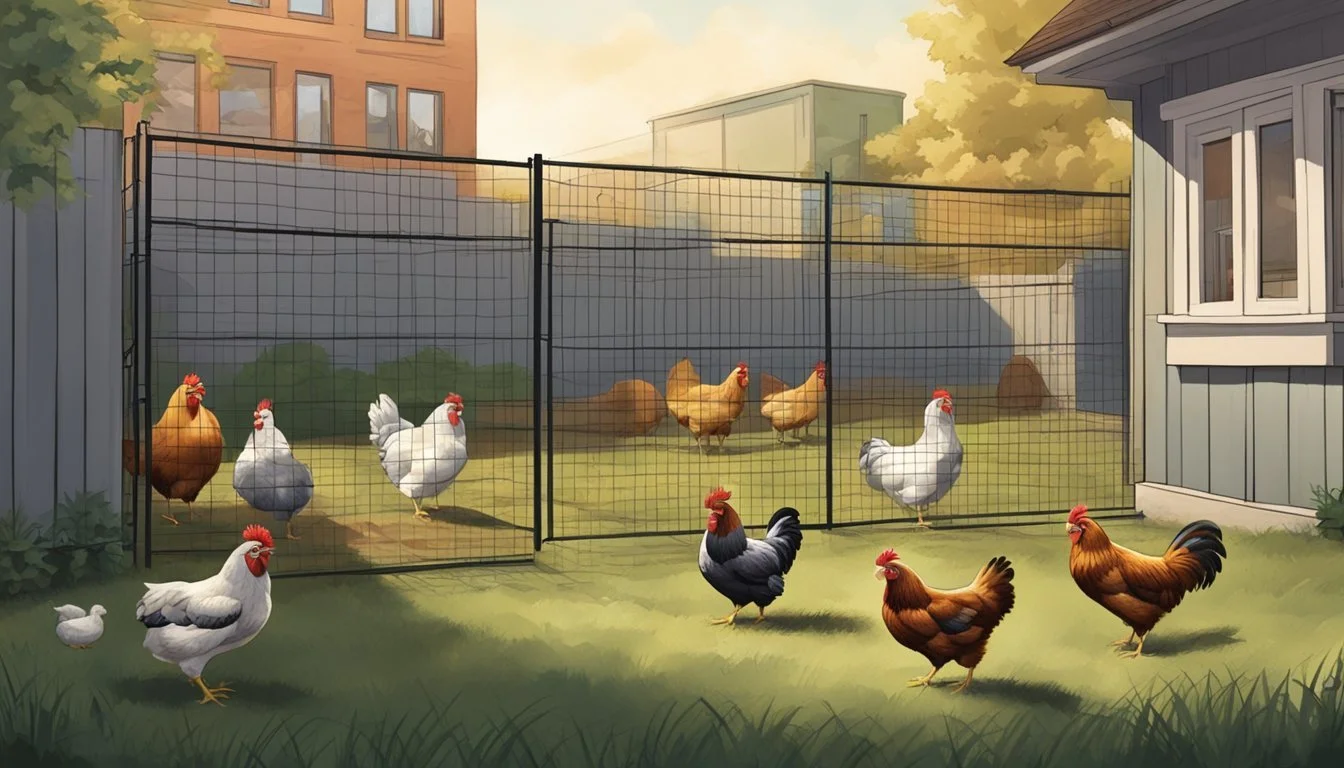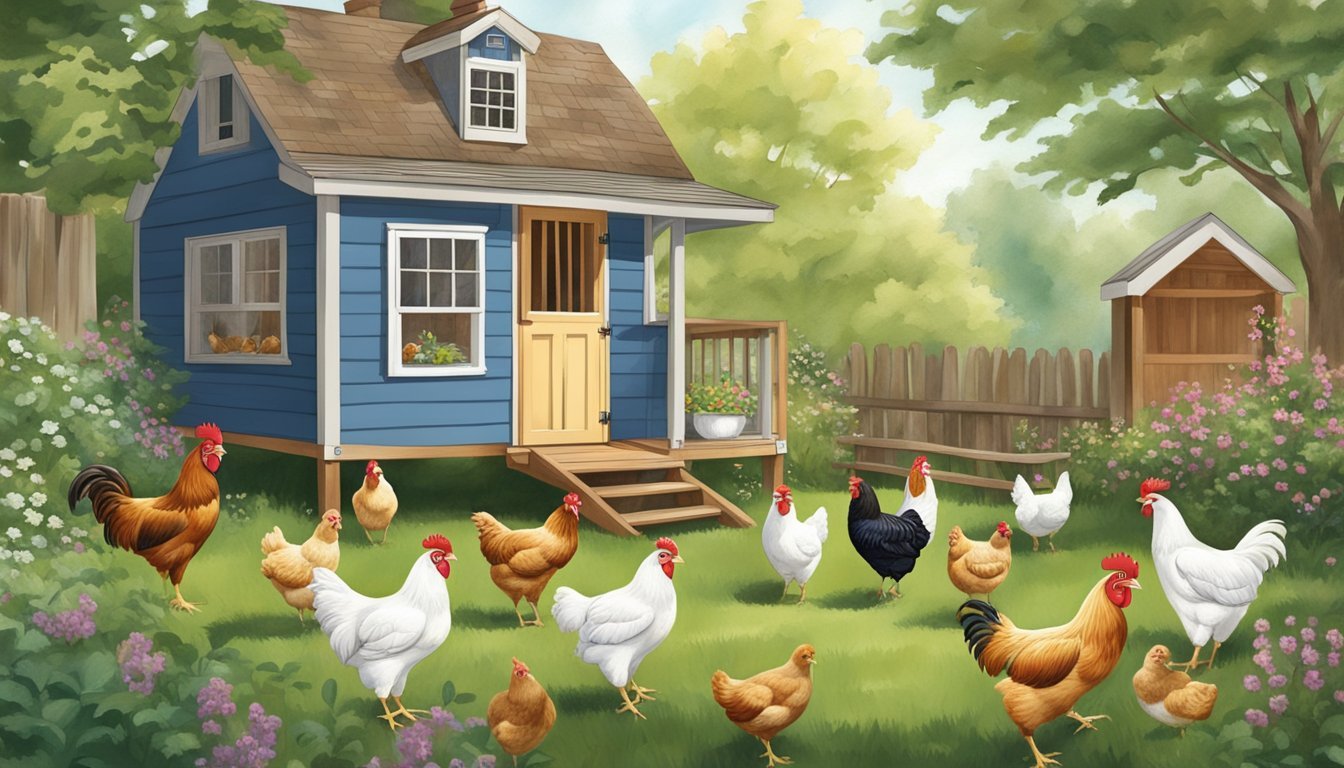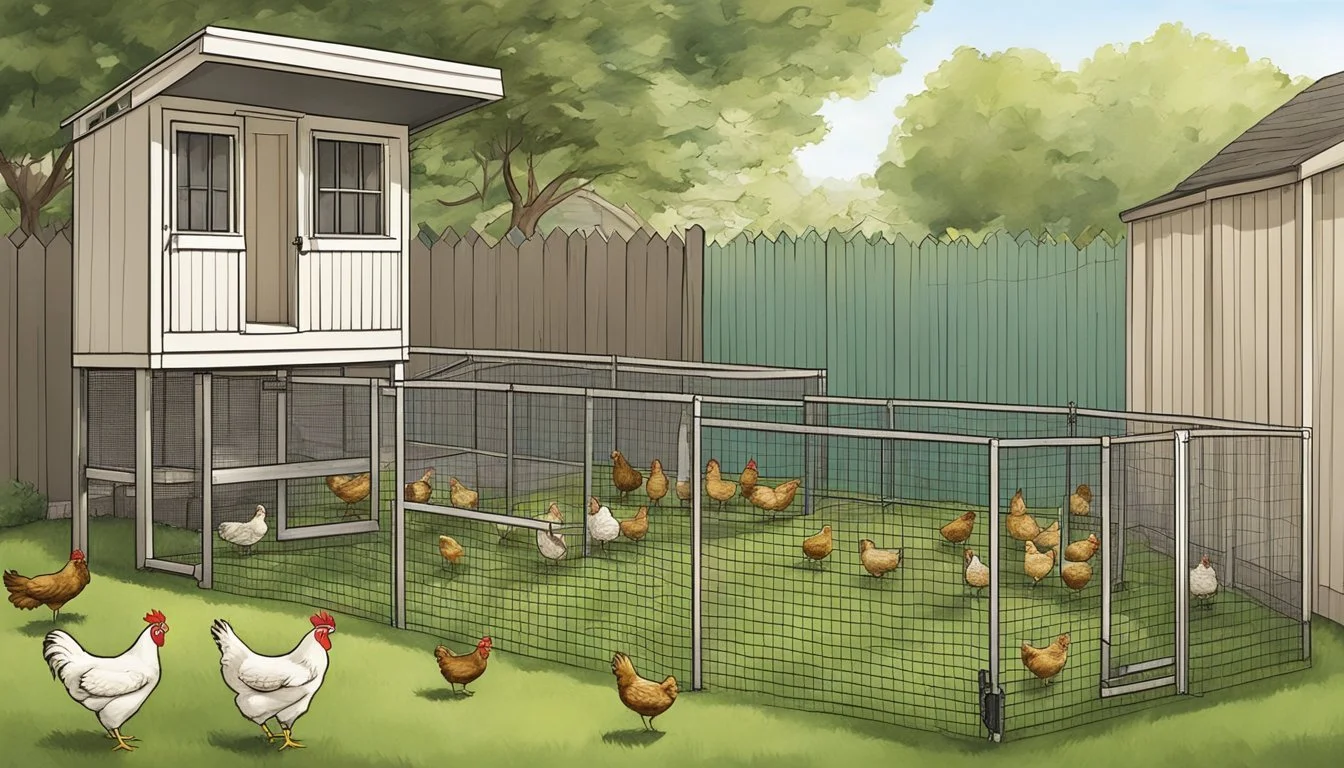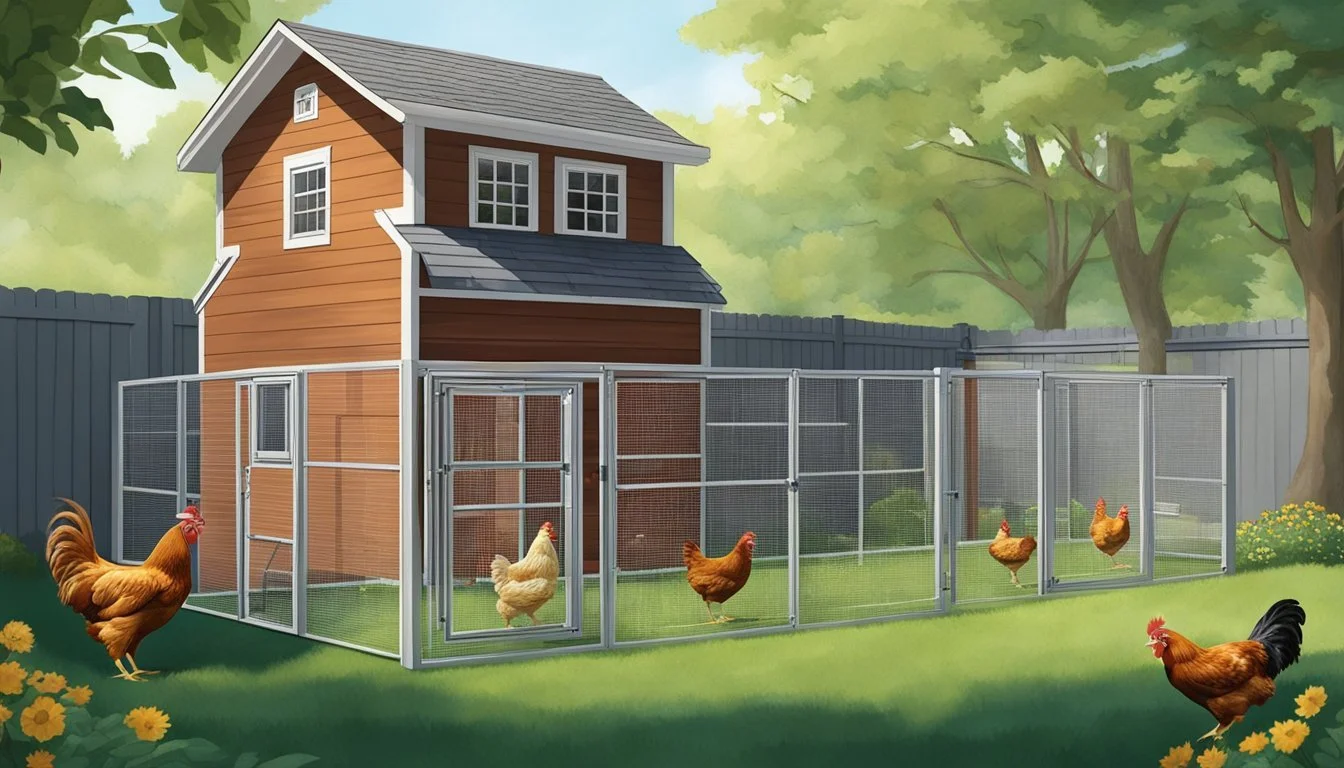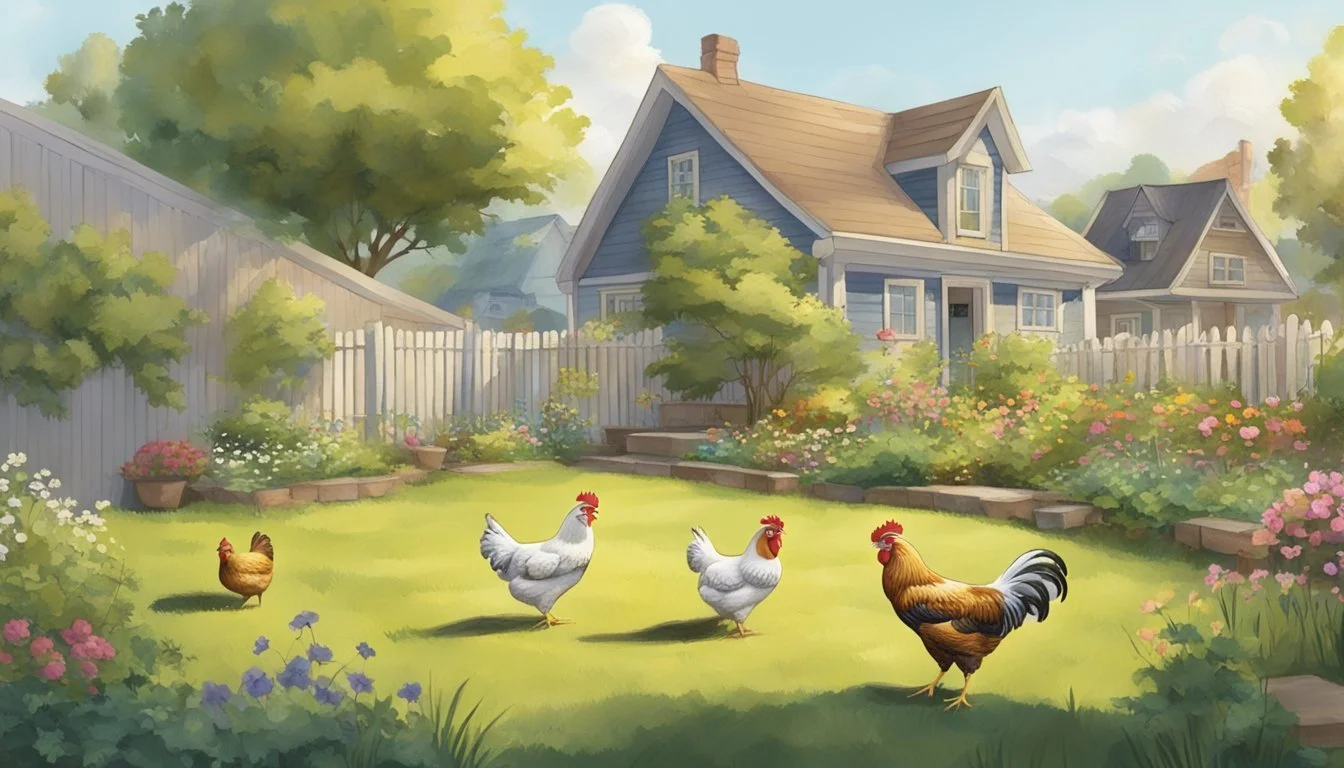Raising Backyard Chickens in Somerville, MA
Essential Tips for Urban Poultry Farming
Raising backyard chickens has become an increasingly popular practice in urban and suburban areas, offering residents the chance to enjoy fresh eggs while engaging with more sustainable living practices. As with any city, Somerville, MA, has specific regulations that residents must follow to ensure that their chicken-keeping is in line with community standards and municipal codes.
In Somerville, residents who wish to keep chickens are allowed to have up to six hens on their property, with roosters expressly prohibited to avoid noise issues. The city has implemented an active permitting process to regulate the practice. Prospective chicken keepers need to comply with certain space recommendations, including providing adequate outdoor run space for the animals, and adhere to setback requirements that dictate the distance coops should be from property lines.
Understanding and adhering to local laws is crucial for maintaining a harmonious relationship with one's neighbors and the wider community. It is essential that residents engage in regular upkeep and sanitation of their chicken coops, manage waste responsibly, and ensure their chickens are kept in good health to prevent the spread of diseases. Those considering chicken-keeping in Somerville are encouraged to familiarize themselves with all pertinent local regulations before bringing hens into their backyards.
Understanding Local Ordinances and Regulations
In the city of Somerville, the local government plays a critical role in determining the framework within which residents can engage in urban agriculture. Somerville’s zoning ordinances specify that residents are permitted to raise up to six hens on their property, but roosters are prohibited to prevent noise issues.
Permit Requirements:
Before raising chickens, a permit must be obtained from the city.
Potential chicken keepers should consult Article 89 of the zoning ordinance, which outlines the requirements for urban farming.
Property Zoning and Coop Placement:
Coops must be placed at least 20 feet from the front property line.
It’s essential to understand and adhere to these local regulations to ensure coops are positioned legally.
Urban Agriculture Initiative:
Somerville’s pioneering Urban Agriculture Initiative supports local food initiatives.
The community is encouraged to engage in practices such as beekeeping and urban farming respecting the legal constraints.
Massachusetts Poultry Regulations:
Beyond local regulations, Massachusetts law also stipulates regulations concerning the sale, transportation, and importation of live poultry (MGL c. 129, § 26B).
The state prohibits practices related to animal fighting (MGL c. 272, §§ 94, 95).
Residents of Somerville and nearby city dwellers from Boston or Cambridge considering poultry keeping should carefully review these standards. Compliance with both local and state regulations ensures a harmonious community and the well-being of backyard poultry.
Choosing the Right Chicken Breeds
In Somerville, MA, backyard chicken enthusiasts have a variety of breeds to choose from, each with its unique characteristics. Whether the goal is to produce eggs, provide meat, or find a versatile breed that serves dual purposes, understanding the breed specifics can lead to a successful and fulfilling chicken-raising experience.
Egg-Producing Breeds
Rhode Island Reds and Leghorns are top choices for egg production. Rhode Island Reds are hardy birds, well-suited to the Massachusetts climate, and can produce around 200 to 300 brown eggs annually. Leghorns are prolific white egg layers, capable of laying up to 280 eggs per year. They are known for their excellent feed-to-egg conversion rate but have a more flighty temperament.
Rhode Island Red: 200-300 brown eggs/year, resilient
Leghorn: Up to 280 white eggs/year, efficient layers
Meat Breeds
Breed selection for meat purposes focuses primarily on growth rate and feed efficiency. Breeds such as the Plymouth Rock, also known as Barred Rocks, are favored for their heavier build and meat quality. They grow relatively quickly and provide a substantial amount of quality meat.
Plymouth Rock: Fast growth, substantial meat yield
Dual-Purpose Breeds
Dual-purpose breeds like the Sussex or Wyandotte are ideal for those seeking both egg production and meat. These breeds balance a friendly temperament with a productive laying cycle and a substantial body size for meat. They tolerate the cold New England winters well, making them suitable for Somerville's climate.
Sussex: Friendly, cold-tolerant, good layers, and meat producers
Wyandotte: Good layers, meat quality, cold-hardy
Setting Up Your Chicken Coop
When establishing a backyard chicken coop, the design, security, and cleanliness are critical factors that ensure the well-being of the flock and ease of maintenance for the owner.
Coop Design Essentials
The design of chicken coops plays a pivotal role in the success of raising chickens. Coops must provide adequate space with at least 2-3 square feet per chicken inside the coop and 8-10 square feet in the outside run area. A well-designed coop should incorporate coop lighting to extend laying cycles and coop heating systems for colder climates, ensuring a comfortable environment for the chickens. It's advisable to have an automatic coop door for safety and convenience, allowing chickens to enter and exit at set times.
Space requirements:
Inside the coop: minimum of 2-3 sq ft/chicken.
Coop and run: minimum of 8-10 sq ft/chicken.
Climate control:
Lighting: Adequate lighting for extended laying.
Heating: Appropriate heaters for warmth.
Coop Security Measures
Security is a non-negotiable aspect of coop construction as it shields the flock from predators. Ensuring a predator-proof coop requires robust materials and tight-fitting doors/latches. Including an overhead netting or wiring in the run can prevent aerial attacks, and burying hardware cloth around the perimeter thwarts digging predators. Automatic coop doors, which close at dusk, add an extra layer of security.
Predator-proofing specifics:
Materials: Use of robust materials resistant to chewing and breaking.
Doors/Latches: Tight-fitting with locks to prevent entry.
Maintaining Cleanliness and Hygiene
A clean coop is crucial for disease prevention and odor control. Bedding materials like straw or pine shavings should be laid out to absorb moisture and replaced regularly to maintain hygiene. Proper waste management practices involving the timely removal of droppings prevent the buildup of ammonia, keeping the air fresh. Utilizing natural coop deodorizers, such as white vinegar or baking soda, can help neutralize odors without harm to the chickens.
Hygiene practices:
Bedding: Use absorbent materials and change frequently.
Waste management: Regular cleaning of droppings to prevent ammonia buildup.
Feeding and Nutrition
Ensuring proper nutrition is essential for the health of backyard chickens in Somerville, MA. Owners should provide a well-balanced diet that meets all the nutritional requirements of their poultry.
Types of Chicken Feed
Chickens require a variety of nutrients that can be found in different types of feed:
Starter Feed is rich in protein and essential for chicks up to 6 weeks old.
Grower Feed has less protein and supports the growth of chickens from 6 to 20 weeks old.
Layer Feed contains calcium and is designed for laying hens to produce strong eggshells.
Supplemental Feed can include grains, fruits, and vegetables. Chickens enjoy leafy greens, carrots, and apples, which provide additional vitamins.
It is important to avoid feeding chickens avocados, chocolate, or anything moldy, as these are toxic to them.
Feeding Equipment
Appropriate feeding systems are important for maintaining clean and accessible food sources:
Feeders: Select a feeder that suits the size and number of chickens. Traditional feeders, troughs, and automatic dispensers are commonly used.
Placement: Feeders should be placed above the ground to prevent contamination from dirt and waste.
Cleaning: Regular cleaning of the feeders is necessary to prevent the spread of disease.
Composting leftover scraps from the chickens can be beneficial for gardens, helping reduce waste and recycle nutrients.
Health and Wellbeing of Chickens
The health and wellbeing of chickens in a backyard setting hinges on diligent disease prevention and proper vaccination. Addressing these aspects is paramount to nurturing a thriving flock in Somerville, MA.
Preventing and Treating Diseases
Chickens are susceptible to a variety of diseases, some of which are transmissible to humans. To minimize disease risk, coop cleanliness is non-negotiable. A clean coop reduces the chance of pest infestations that can transmit diseases. It's also essential to limit contact between backyard chickens and wild birds, as they can be carriers of diseases such as avian influenza.
Key steps for disease prevention include:
Regularly cleaning and disinfecting the coop
Managing waste effectively to avoid attracting pests
Ensuring proper ventilation to reduce the spread of respiratory illnesses
Isolating new birds before introducing them to the flock
When chickens show signs of illness, timely intervention is critical. Treatment varies depending on the specific disease but often involves quarantine to prevent spread, administering appropriate medications, and supporting the bird's immune system through nutrition. Always consult with a vet specialized in avian medicine for accurate diagnosis and treatment options.
Routine Vaccinations
Vaccinations play a significant role in protecting chickens from prevalent diseases. For chicks, the first few weeks of life are crucial for establishing a strong health foundation through vaccinations. Vaccination schedules may vary; however, common vaccines target diseases such as Marek's disease, Newcastle disease, and Infectious Bronchitis.
Vaccination chart for backyard chickens:
Age (weeks) Vaccine 1 Marek's disease 2-3 Newcastle disease 4-6 Infectious Bronchitis
Timing and adherence to the vaccination schedule enhance the flock's immunity, reducing the likelihood of disease outbreaks. It’s advisable to obtain vaccines from reputable suppliers and follow the manufacturer's guidelines for administration. While some vaccines are administered by subcutaneous injection, others may be given in drinking water or as a spray.
Daily Management and Care
Raising chickens requires dedication to a daily routine to ensure the health and productivity of your flock. In Somerville, MA, adhering to local regulations, including coop cleanliness and proximity, is crucial for successful backyard chicken care.
Regular Inspections
Regular inspections are crucial for maintaining the health and safety of backyard chickens. Owners should:
Check for signs of illness or distress among the chickens, which could include changes in eating habits, abnormal droppings, or lethargy.
Ensure the coop is secure from predators, particularly at night. Coop cameras can be installed for additional security and monitoring.
Verify that food and water containers are clean and filled, as chickens need constant access to fresh water and a balanced diet.
Monitor the level of coop cleanliness, removing droppings and refreshing bedding materials to prevent the spread of disease.
Egg Collection Practices
Egg collection is a daily task that, when done correctly, ensures a supply of fresh eggs. Consider the following:
Collect eggs at least once a day to minimize the chances of them getting dirty or being eaten by the hens.
Use nesting boxes to encourage hens to lay in a designated area, making egg collection easier.
After collection, eggs should be wiped with a dry cloth if they have dirt on them and refrigerated promptly to preserve their freshness.
Understanding and Complying with Slaughtering Regulations
In Somerville, Massachusetts, residents interested in raising backyard chickens must pay close attention to slaughtering regulations. Compliance with both local regulations and Massachusetts chicken ordinances is imperative for those who plan to slaughter chickens.
Local Regulations in Somerville:
A permit may be required to slaughter chickens. Residents should consult with the City of Somerville’s Health Department for specific ordinances.
Slaughtering must be conducted in a humane manner, adhering to the American Veterinary Medical Association (AVMA) guidelines.
Massachusetts Chicken Ordinances:
State law regulates the sale, transportation, or importation of live poultry, which can impact slaughter processes.
Massachusetts law also dictates the humane treatment of animals; cruelty or neglect in the slaughtering process may result in legal consequences.
Health and Sanitation Considerations:
Ensure that the slaughtered chickens are free of disease.
Dispose of waste properly, ideally through recommended composting methods.
In summary, residents must review and understand the specific requirements for slaughtering chickens. Slaughtering without understanding relevant regulations can lead to violations. It is advisable to contact local authorities for the most current and applicable information.
Community Integration and Neighbor Relations
Raising backyard chickens can be an enriching experience, but it necessitates a considerate approach toward community and neighborhood harmony. In Somerville, Massachusetts, urban agriculture is embraced through local ordinances which outline specific restrictions to ensure neighborly peace.
Residents are allowed to keep up to a maximum of 6 hens on their property, while roosters are prohibited, a measure designed to minimize noise disruptions. The placement of coops is also regulated, requiring that they be at least 20 feet from the front property line, which helps maintain the aesthetic and cleanliness standards of the neighborhood.
Good Practices for Neighbor Relations:
Communication: Share plans with neighbors and remain open to their feedback.
Cleanliness: Regularly clean coops to prevent odors and maintain hygiene.
Aesthetic: Choose coop designs that blend well with community surroundings.
Noise Control: Implement measures to keep hens quiet, especially during early morning and evening hours.
The essence of Somerville's approach lies in its acknowledgment of urban agriculture's potential for fostering community interaction and promoting local, sustainable food sources. Yet, it firmly upholds the need for individual responsibility in adhering to regulations that safeguard neighbor relations.
Residents interested in raising chickens must ensure they are well-versed with Somerville's Urban Agriculture Ordinance and the expectations for proper upkeep and community integration. This balance aims to cultivate a harmonious atmosphere whereby local enthusiasts can enjoy the benefits of urban farming without impinging upon the comfort and well-being of their neighbors.
Advanced Tips for Experienced Chicken Raisers
Experienced chicken raisers in Somerville, MA, looking to enhance their skills can focus on the selective breeding of chickens, sophisticated methods to expand their flock, and refined strategies for showing their birds.
Breeding and Hatching
Breeding chickens effectively requires understanding genetics and selecting the right chicken breeds to produce desirable traits. Hatching eggs successfully hinges on maintaining proper temperature and humidity in the incubator, typically between 99.5°F and 102°F with about 50-65% humidity. Monitoring and turning the eggs frequently is essential until a few days before they are due to hatch.
Incubation Conditions
Temperature: 99.5°F to 102°F
Humidity: 50-65%
Turning: At least 3 times per day
Expanding Your Flock
When expanding a flock in Somerville, one should introduce new birds gradually to maintain the flock's hierarchy and reduce stress. Quarantining new chickens for at least 30 days prevents the spread of potential diseases. Providing enrichment through toys for chickens is important for their mental and physical well-being.
Introductions
Quarantine: Minimum 30 days
Gradual Introduction: Over several weeks
Enrichment
Examples: Perches, mirrors, hanging vegetables
Show Preparation
Preparing chickens for shows entails more than just training; it requires meticulous grooming and conditioning. Feathers should be clean and lustrous, nails trimmed, and the combs and wattles bright in color. Familiarizing chickens with travel and handling reduces stress during the actual show events.
Conditioning
Bathing: As needed
Diet: Balanced for optimal feather and wattle condition
Training
Handling: Regularly, to acclimate to human contact
Travel: Practice to ensure chickens remain calm
Resources and Support for Backyard Chicken Owners
Backyard chicken enthusiasts in Somerville have a variety of resources at their disposal to ensure a successful and compliant chicken-raising experience. Community engagement is a cornerstone of local urban agriculture, and residents can tap into a network of fellow poultry keepers for support and learning.
Local Government and Ordinances Chicken owners should first acquaint themselves with local regulations. The Somerville government website provides detailed ordinances related to the keeping of hens, including the prohibition of roosters and coop placement. This vital information helps beginners ensure their setup meets local legal standards.
Support Groups and Community For those looking for a sense of community and shared experiences, Somerville residents can join the MA Backyard Chicken Owners group on Facebook. This private forum allows for an exchange of tips, stories, and advice that is invaluable to both novices and experienced chicken owners alike.
Expert Guidance Beginners in Somerville seeking professional advice can reach out to Green City Growers, where CEO Jessie Banhazl and her team promote urban farming. They provide expert tips that are tailored to the unique challenges and opportunities of raising chickens in an urban setting like Somerville.
Educational Resources Those new to backyard chickens can leverage local businesses like Yardbirds Backyard Chickens for foundational knowledge and sustainable practices. With a focus on education, they offer resources that help with everything from coop construction to hen health.
By incorporating local regulations, community support, expert advice, and educational resources, residents of Somerville can embark on their backyard chicken rearing journey with confidence.
Conclusion
Raising backyard chickens in the city of Somerville, MA, has its specific set of regulations to comply with. Residents can keep up to six hens, but roosters are not permitted. The importance of planning cannot be overstated; ensuring compliance with local ordinances will lead to a harmonious coexistence with neighbors and within the city.
Hen Coops: They must be situated at least 20 feet from the front property line, ensuring they are placed thoughtfully within private properties.
Health and Hygiene: Chickens must be maintained in good health. Regular veterinary check-ups are advised to prevent diseases that could affect the flock and potentially the community.
Waste Management: It is crucial to dispose of chicken waste appropriately. Composting is a recommended practice for ecological waste management, turning potential refuse into beneficial compost.
Somerville's approach to permitting process for residents interested in raising chickens signals a forward-thinking stance on urban agriculture. Enthusiasts should keep informed of updates to regulations, as the city might adjust rules to better accommodate urban farming trends and address community concerns.
Residents should note that regulations are subject to change, and staying informed through official Somerville channels is recommended for current and future chicken owners. Whether for eggs, pets, or as a sustainable practice, keeping backyard chickens in Somerville can be a rewarding endeavor when done in accordance with city guidelines.

